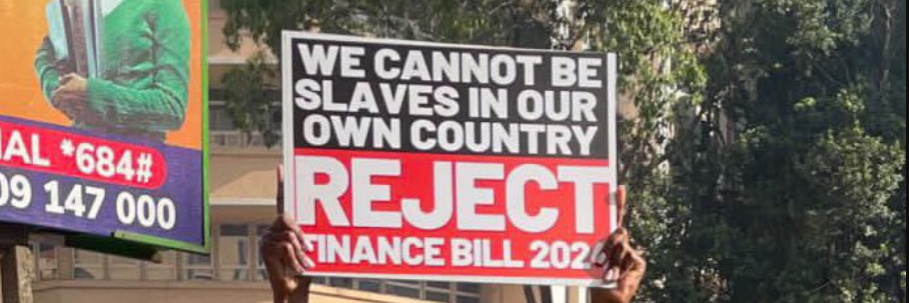Hundreds of young Kenyan have taken to the streets of Nairobi in protest of the Financial Bill 2024. Source: African Archives via X.
Protests against Kenya’s proposed tax hikes have forced President William Ruto to express his readiness for “a conversation” with “peaceful” youth demonstrators.
Hundreds of young Kenyan have taken to the streets of Nairobi on Tuesday 18 June outraged at Ruto’s administration for going back on its pledge to reduce taxes and lower cost of living.
The demonstrations were organised on social media and led mainly by Kenyan youth who livestreamed the protests.
Ruto’s government were caught off guard at the growing discontent to his economic policies.
“I am very proud of our young people… they have stepped forward peaceful and I want to tell them we are going to engage them,” Ruto said in his first public comments on the protests.
“We are going to have a conversation so that together we can build a greater nation,” he further added during a church service in the Rift Vally town of Nyahururu.
Hanifa Adan, a protest organiser, told AFP that Ruto needed to “respond publicly” to their demands.
“President Ruto can’t claim to support us while his police brutalise peaceful protesters,” she said.
“We’re past the talking stage and won’t be silenced. We demand an end to police violence, respect for our constitutional rights, and the freedom to speak up without fear of arrest or harm.”
The demonstrations have mostly been peaceful, but there were reports of police breaking up crowds with tear gas, water cannons, and rubber bullets, resulting in casualties.
Amnesty International Kenya said on Sunday that “in the last 72 hours, protest organisers, content creators, medics and protesters have been profiled, abducted and detained in violation of our laws”.
A protestor, 21-year-old Evans Kiratu, was “hit by a tear gas canister” during the protests and died in hospital, told a Kenya Human Rights Commission official the AFP.
The Independent Policing Oversight Authority (IPOA) is investigating deaths caused by shootings during protests.
The government was forced to amend the Financial Bill 2024 after smaller demonstrations broke out in Nairobi last Tuesday.
The changes included scrapping levies on bread purchases, car ownership, and financial and mobile services.
However, the changes have failed to satisfy protesters as it includes other tax increases aimed at raising revenue for the government’s 2024-25 budget of 4.2 trillion Kenyan shillings (4.9 billion).
In response, protesters have called for a national strike on 25 June for the bill to be scrapped completely.





